|
|
|
Sort Order |
|
|
|
Items / Page
|
|
|
|
|
|
|
| Srl | Item |
| 1 |
ID:
050047
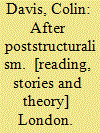

|
|
|
|
|
| Publication |
London, Routledge, 2004.
|
| Description |
210p.Pbk
|
| Standard Number |
041531609X
|
|
|
|
|
|
|
|
|
|
|
|
Copies: C:1/I:0,R:0,Q:0
Circulation
| Accession# | Call# | Current Location | Status | Policy | Location |
| 047455 | 801.95/DAV 047455 | Main | On Shelf | General | |
|
|
|
|
| 2 |
ID:
085891
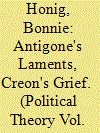

|
|
|
|
|
| Publication |
2009.
|
| Summary/Abstract |
This paper reads Sophocles' Antigone contextually, as an exploration of the politics of lamentation and larger conflicts these stand for. Antigone defies Creon's sovereign decree that her brother Polynices, who attacked the city with a foreign army and died in battle, be dishonoured - left unburied. But the play is not about Polynices' treason. It explores the clash in 5th century Athens between Homeric/ elite and democratic mourning practices. The former (represented by Antigone) memorialize the unique individuality of the dead, focus on the family's loss and bereavement and call for vengeance. The latter (represented by Creon) memorialize the dead's contribution to the immortal polis and emphasize (as in the Funeral Oration) the replaceability of those lost. Each economy of mourning sees the other as excessive and politically unstable. The remainders of both, managed by way of exception institutions such as tragedy and the Dionysian Festival, continue to haunt us now.
|
|
|
|
|
|
|
|
|
|
|
|
|
|
|
|
| 3 |
ID:
050990
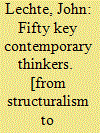

|
|
|
|
|
| Publication |
London, Routledge, 2003.
|
| Description |
xi, 251p.
|
| Standard Number |
9780415074087
|
|
|
|
|
|
|
|
|
|
|
|
Copies: C:1/I:0,R:0,Q:0
Circulation
| Accession# | Call# | Current Location | Status | Policy | Location |
| 047925 | 190.904/LEC 047925 | Main | On Shelf | General | |
|
|
|
|
| 4 |
ID:
120729
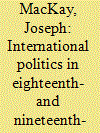

|
|
|
|
|
| Publication |
2013.
|
| Summary/Abstract |
Using historical analysis of relations between city-states and other international actors in Central Asia during the eighteenth and nineteenth centuries, this article evaluates new structural theories of international politics, chiefly those of David Lake and Jack Donnelly. Pre-colonial Central Asia offers a usefully tough case for structural theories, since it so little resembles the modern international order that these theories were developed to describe. Empirically, the article proceeds by evaluating the region's city-states' relations with three groups of actors: one another; neighbouring empires; and the many non-state actors present at the time. It concludes with an assessment of the merits of the new structuralisms, and a discussion of their value for constructivist international-relations theories of international change.
|
|
|
|
|
|
|
|
|
|
|
|
|
|
|
|
| 5 |
ID:
108240
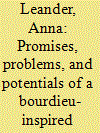

|
|
|
|
|
| Publication |
2011.
|
| Summary/Abstract |
The promise of Bourdieu-inspired analysts to provide a "different reading" of the international is receiving increasing attention in the academic discipline of international relations (IR). This attention also generates awareness and of problems inherent in the Bourdieuian approach and a desire to develop it further (or abandon it). These discussions have often focused on the difficulties that arise for IR as a consequence of the structuralism of Bourdieu's approach, and as such they dovetail with the discussions between Bourdieu's "critical sociology" and the "pragmatic school" in the French context. This article uses these discussions to clarify what it entails to paint a different picture-my picture-of the international using Bourdieu's thinking tools. More specifically, it argues that Bourdieu's thinking can be used as a basis for a non-structuralist staging of the international taking on board the critique raised by pragmatists and integrating many of the insights developed by them. Bourdieu often referred to his own thinking as a "structuralist constructivism," so this article takes Bourdieu's thinking in a direction he may not have liked to go. However, it sticks closely to the spirit of his contention that one should never privilege scholastic theorizing for the sake of theorizing nor hesitate to "read a thinker against himself."
|
|
|
|
|
|
|
|
|
|
|
|
|
|
|
|
| 6 |
ID:
069873
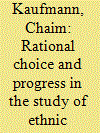

|
|
|
|
|
| Publication |
2005.
|
| Summary/Abstract |
Through an analysis of eight recent books and a number of articles and papers, this article evaluates recent progress in the study of ethnic conflict, including large scale conflicts and episodic riots. Four main approaches have been applied to the study of ethnic conflict: rational choice, constructivism, essentialism, and structuralism (or realism). This evaluation of recent work includes that rational choice has been the least successful of the approaches; its focus on individuals' pursuit of (mainly) material benefits makes it difficult to recognize or to admit the explanatory power of nationalist feelings that do not depend on the prospect of material benefits. Constructivism has been the most influential approach over the past few decades but until recently has suffered from methodological weaknesses that have hindered testing. Essentialism has been out favor for as long as constructivism has been in, but recent methodological improvements have produced strong work that has resurrected this approach. Structuralism is the youngest approach; it is still immature but has already yielded important new insights. Some eclectic approaches are emerging that combine strengths of the latter three approaches; it remains to be seen whether comparable eclecticism will combine rational choice with one or more of the others
|
|
|
|
|
|
|
|
|
|
|
|
|
|
|
|
| 7 |
ID:
163365
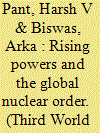

|
|
|
|
|
| Summary/Abstract |
The global nuclear order has been built around the Treaty on the Non-Proliferation of Nuclear Weapons (NPT), primarily aimed at addressing the challenges of nuclear non-proliferation. In the last two decades, this order has faced growing challenges from the demands of emerging nuclear powers which it has been unable to meet effectively. These powers have either been outside the order, like India, Israel and Pakistan, or withdrawn from it, like North Korea, or could leave in future due to arguably compelling security concerns, like Iran, Japan and South Korea. These nations and the challenges they pose to the global nuclear order are mostly considered unique and are treated as exceptional. This paper examines the case of India which has found partial acceptance into the extant order from being a pariah nuclear state outside the NPT to a de facto nuclear weapon state designated by the US–India civil nuclear cooperation pact of 2008. It explicates the ongoing process of its integration into the order, underlining why this task remains daunting. Other than factors unique to India, the case of its rise in the global nuclear order captures the structural shortcomings of the extant order. While these underlying shortcomings remain, new nuclear powers, with or without support from the established ones, are likely to challenge the order in future.
|
|
|
|
|
|
|
|
|
|
|
|
|
|
|
|
| 8 |
ID:
177055
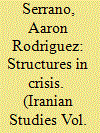

|
|
|
|
|
| Summary/Abstract |
This paper proposes an exploration of the films of Iranian director Asghar Farhadi. It employs a methodology based on textual analysis, focusing specifically on the structural design of his films and the focalization processes of his scripts. It shows how Farhadi’s work can be understood as a coherent research project with a uniquely solid model based on chronological linearity as a way to explore the violent breakdown of different emotional communities: families, marriages, groups of friends, etc. At the same time, it considers how all the focalization processes in his films are oriented toward two main concepts: knowledge (of the characters, but also of the audience) and pain (of living in a [narrative] world afflicted by meaninglessness).
|
|
|
|
|
|
|
|
|
|
|
|
|
|
|
|
| 9 |
ID:
137258
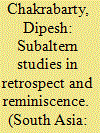

|
|
|
|
|
| Summary/Abstract |
This essay aims to provide a context for the intellectual project of ‘subaltern history’ and the associated series, Subaltern Studies, by undertaking a retrospective description and evaluation of the project and by drawing on the history of Dipesh Chakrabarty's personal involvement in it. It also attempts to outline some of the limitations of the original conception of the project as well as highlight some of its more enduring legacies.
|
|
|
|
|
|
|
|
|
|
|
|
|
|
|
|
|
|
|
|
|